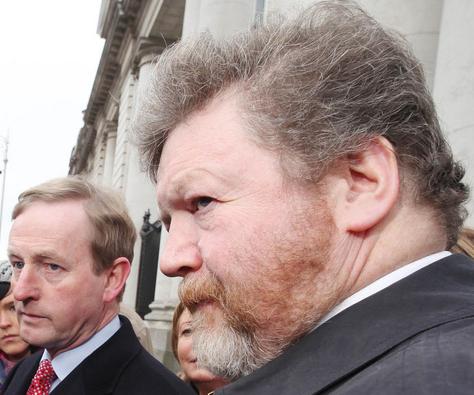James Reilly's many advisers

Minister for Health James Reilly is over his quota of ministerial advisers and without any specific expertise in his priority area of health reform – universal health insurance. Martin Connor, Reilly’s most senior special adviser, was appointed last June for six months and in December signed a three-year contract worth €480,000. He is paid €160,000 a year for a time commitment of just 80% and he spends ‘on average’ half of his time in California, as he is a research fellow in Stanford University, California.
Connor is the most senior adviser in the minister’s Special Delivery Unit, which James Reilly set up as his “hands-on” “nerve centre” and which he has charged with achieving his own targets of reducing waiting times for public patients for hospital treatment.
As well as appointing him as senior special adviser to the minister and the Special Delivery Unit, Reilly also appointed Martin Connor to the HSE board. A quick scan through the HSE board minutes show that meetings are generally well-attended by the 10 board members, but that of the 13 meetings held since last June - when he was first appointed - Connor has attended just four of them; hardly surprising given his base is in the USA.
So how many advisers are there in the Department of Health and what are they paid?
According to the Department, James Reilly has two special advisers – Mark Costigan, who is his press adviser, and Seán Faughnan. Costigan previously worked for Mary Harney as deputy government press secretary – he was a PD appointment and so there was some surprise when Reilly appointed him. He is on the top salary of €92,672 allowed for special advisers.
Reilly’s second special adviser, Seán Faughnan, worked in Fine Gael as Enda Kenny’s adviser when the party was in opposition and is considered “chief architect of their Fair Care health policy”. He has been a full-time adviser with James Reilly for a year, and is on the minimum of the ministerial special adviser scale - set at €80,000.
The Department of Health seems to be denying that Martin Connor is a special adviser, saying now in communications to me that he is there to provide “expert advice”, and an “international expert”. However, I have emails from them from September and October clearly stating Martin Connor is a special adviser to the minister and the SDU. Little wonder they are denying it - given how much he is paid beyond the recommended pay-scale for special advisers.
Guidelines on special advisers
There are guidelines that Government departments are supposed to operate under when it comes to advisers. The Department of Public Expenditure and Reform personnel circular dated 24 March 2011, entitled Ministerial appointments to the 31st Dáil, clearly specifies how special advisers are appointed: they require the approval of Government under section 11 of the 1997 Public Service Management Act; they require the sanction of the Minister for Finance; and if people are being appointed from outside civil service they require the sanction of the Taoiseach. Also this circular states that a minister may have “a maximum of two special advisers” and only in “exceptional circumstances where a specific need is identified can one be appointed to a Minister of State”.
The circular clearly states that pay is at the Principal Officer grade, which ranges between €80,000 to €92,672, and that sanction for pay must come from the Minister for Finance with the approval of the Minister of Public Expenditure and Reform.
New appointment
But on 23 February 2012, the Department of Health confirmed that Seán Faughnan is moving to the Department of the Taoiseach for two-thirds of his time and will remain for one-third of his time in health. Also, “Minister Reilly plans to appoint Maureen Windle” to the remaining two-thirds as a new special adviser.
Maureen Windle was CEO of the old Northern Area Health Board (NAHB). She, along with the other nine other health board CEOs, got hefty pay-offs when Health Boards were abolished and merged into the HSE.
No specific figures have been released, but on average the old health CEOs were paid €400,000 as a handshake to leave the position. She was CEO of NAHB when Reilly was a local GP and medical representative on the board. So they have that connection, and are thought to trust each other.
I was told that she will be paid in line with the PO scale, but it will be interesting to see if this is on top of the pension she already gets as an ex-Health Board CEO.
She has been doing a variety of things since 2005. She has worked as a management consultant, is a director of Fold Ireland and the Irish Medicines Board and chairs their audit committees. She is also a director of Sodexo Zehnacker Healthcare Ireland, a private company which provides food, catering, cleaning and security services for hospitals, nursing homes and other healthcare facilities in Ireland.
On 23 February, the Department of Health said she will be work-sharing with Seán Faughnan and they will “both work on strategic health reform aspects of the Programme for Government”.
So, Minister Reilly is over his quota of special advisers, and one of them is paid twice the rate for advisers as stipulated by his own Government. Yet what is most extraordinary - given the Government’s commitment to introduce universal health insurance - is that none of his advisers are experts in this area.
